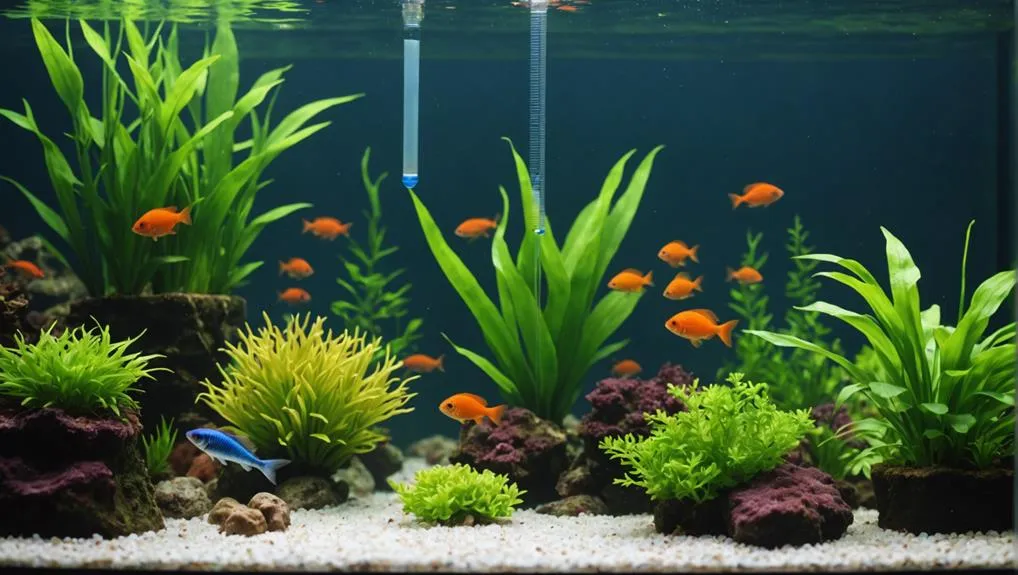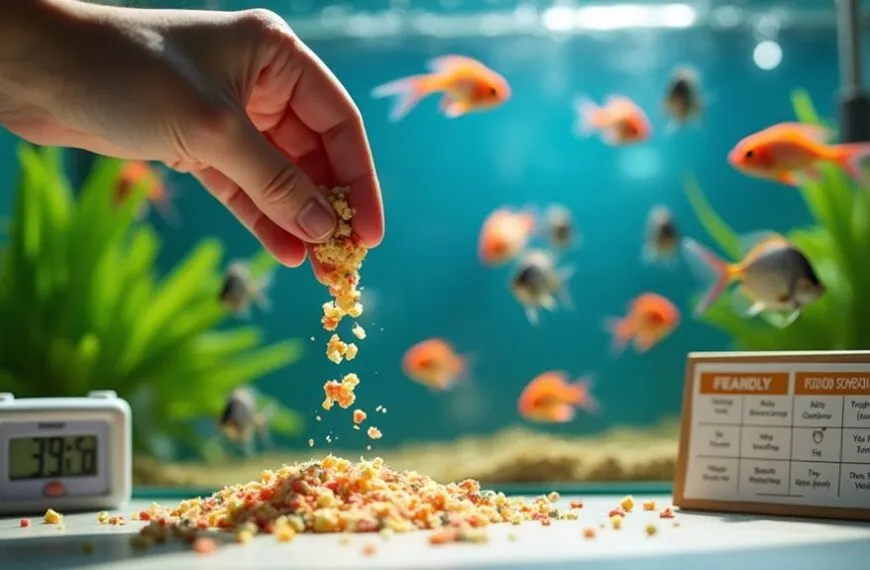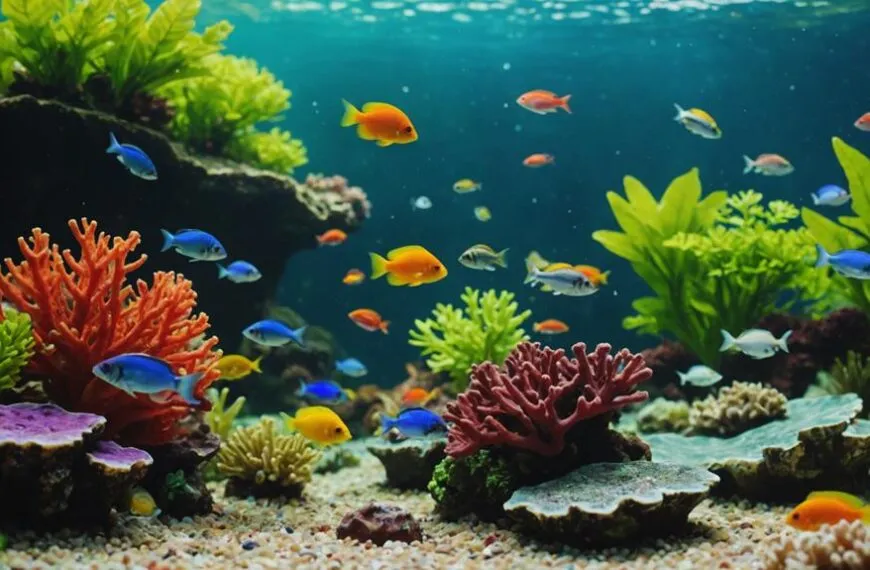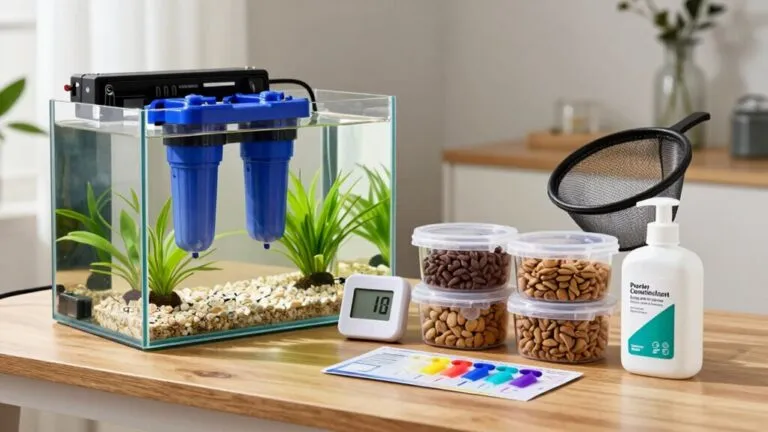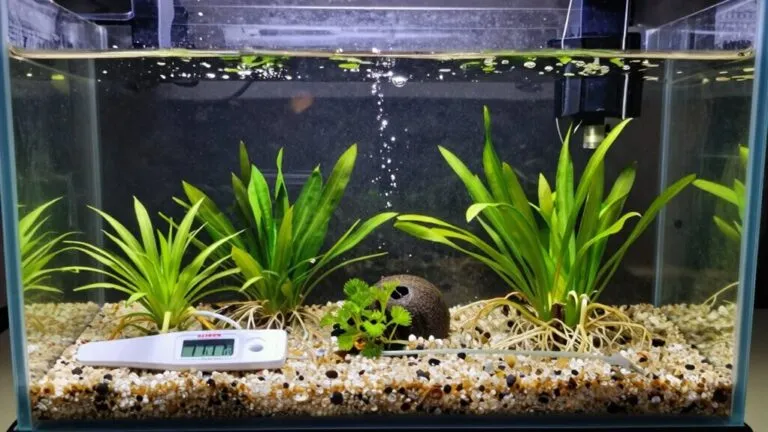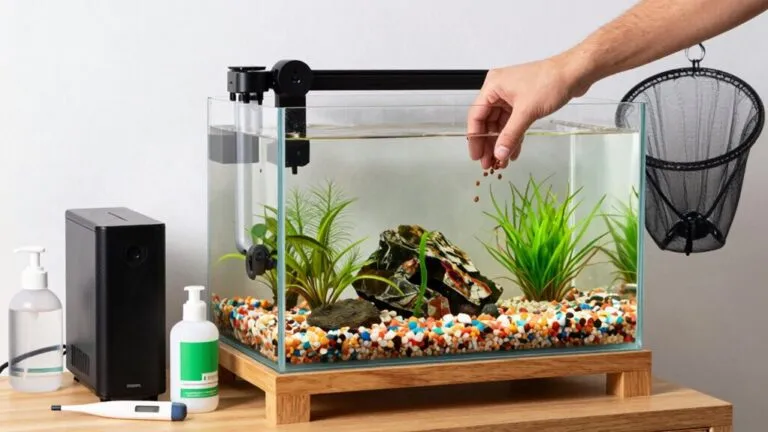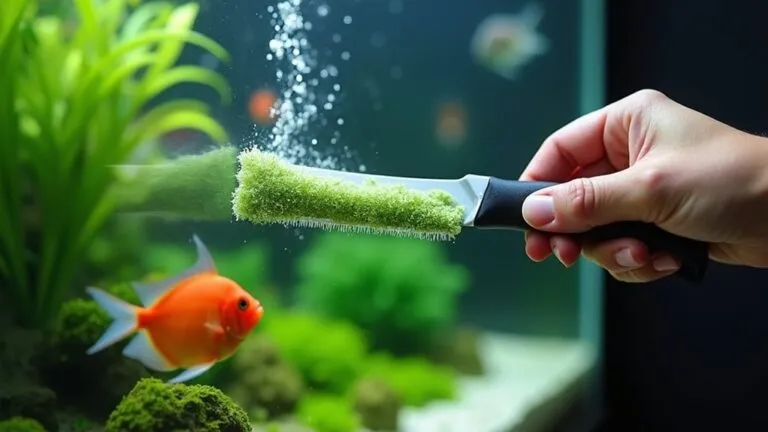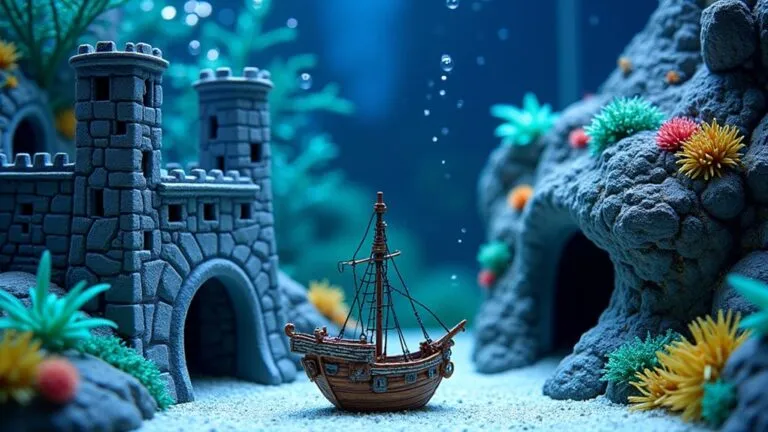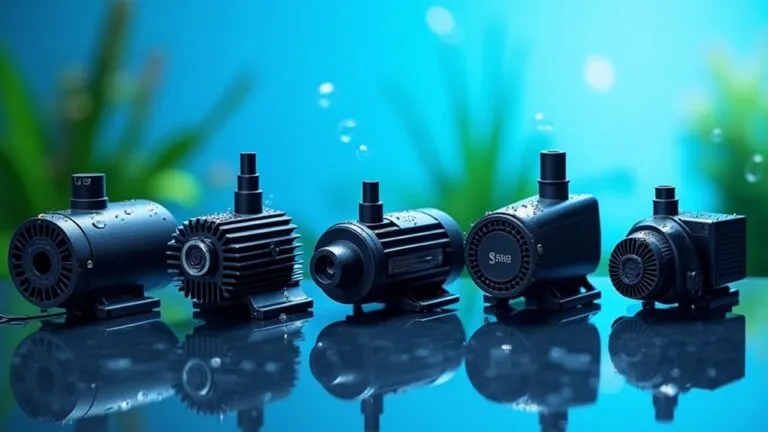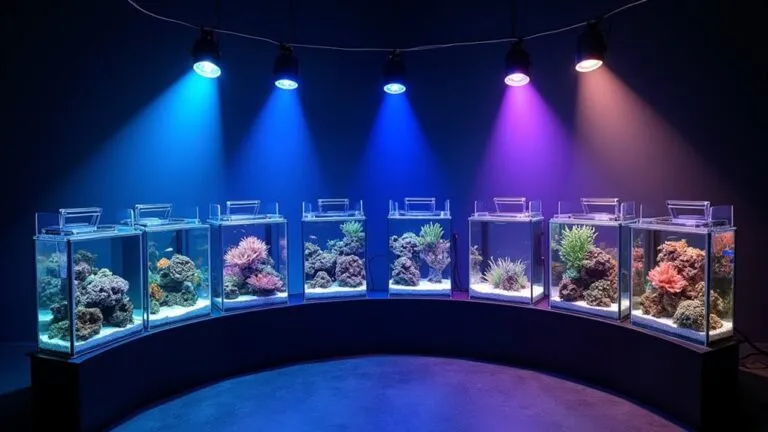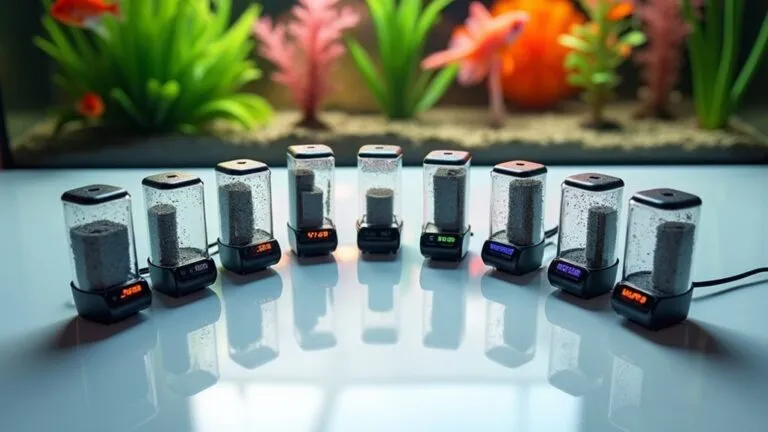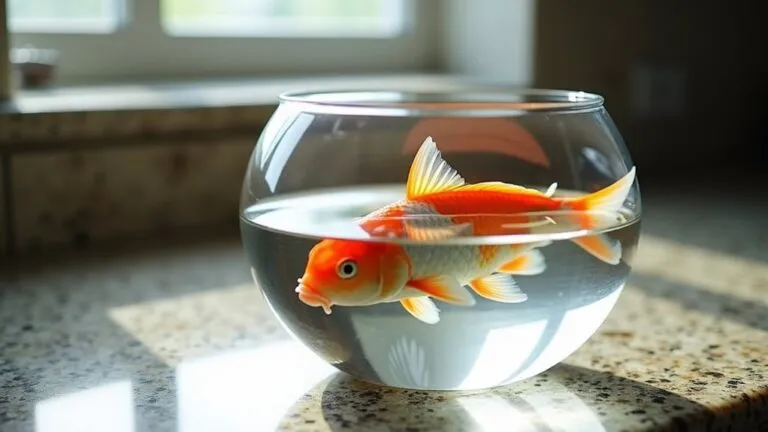If you think your fish might be overfed, look out for these five telltale signs! First, you might notice visible bloating—think fish in a thick coat of marshmallow fluff. Next, excess uneaten food could be floating around, which you definitely don't want turning into a smelly mess. Cloudy water? That's usually a sign of decomposing leftovers. Increased algae growth, like uninvited green patches, can also mean you've been a bit too generous with the portions. Lastly, watch for behavioral changes; lethargy or increased aggression could spell trouble. Stick around, and you'll discover even more ways to keep your fishes happy and healthy!
Contents
Visible Bloating in Fish
One clear sign your aquarium fish might be overfed is visible bloating. When you notice your fish looking a bit puffed up, it's often a result of overfeeding. Excess food can pile up in their digestive systems, leading to a swollen appearance that can be concerning. If you see protruding scales, resembling a pinecone, this could indicate serious health issues that need attention.
Regular maintenance routines, including monitoring water parameters, can help catch problems early and ensure a healthy environment for your fish.
Bloat doesn't just stop at a round belly; it can bring along friends like lethargy and swimming difficulty. Your fish may seem less energetic, floating aimlessly instead of darting around. In species like guppies and bettas, excessive feeding can cause constipation, adding to their discomfort.
To help maintain fish health, it's essential to practice proper feeding. Monitor how much you're giving them and remove any uneaten food promptly. This simple step can help prevent the stress of bloating and keep your aquatic friends feeling their best.
Excess Uneaten Food
Excess uneaten food in your aquarium can quickly turn into a serious problem. When you notice leftover food floating on the surface or resting on the tank substrate, it's a clear sign of overfeeding. This uneaten food doesn't just sit there; it decays and can lead to poor water quality. As it breaks down, it elevates ammonia levels, putting your fish at risk.
Nutrient overload from decomposing food can also contribute to excessive algae growth, further complicating your tank's ecosystem.
To keep your aquatic friends healthy, it's crucial to remove uneaten food promptly—ideally within a few minutes after feeding. Consider it a little fishy clean-up duty! If you let that excess food linger, you'll find yourself dealing with more frequent gravel vacuuming to maintain a clean environment.
Plus, that organic material can cause cloudy water conditions, which is no fun for anyone.
Sticking to a consistent feeding schedule can help you avoid these pitfalls. Remember, fish might be enthusiastic about mealtime, but they don't always need a buffet! By keeping an eye on leftover food and adjusting your portions, you'll create a happier, healthier home for your aquatic companions.
After all, a clean tank means happy fish—and who doesn't want that?
Cloudy or Murky Water
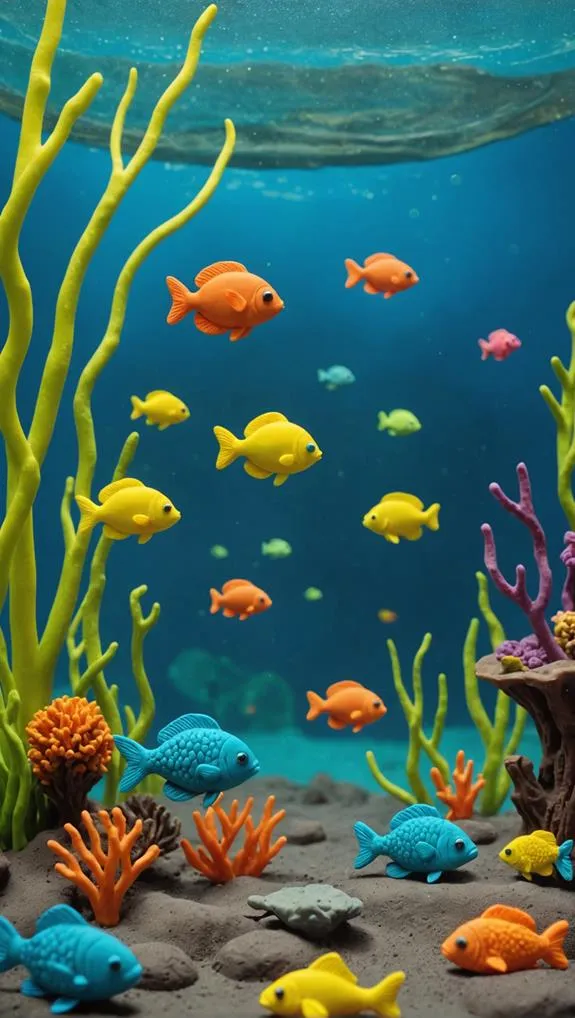
If you've noticed your aquarium water looking cloudy or murky, it's often a sign of trouble brewing beneath the surface.
This cloudiness can stem from overfeeding, which leads to uneaten food decomposing in your tank. As that food breaks down, it creates organic waste, raising ammonia levels and ultimately harming your fish's health. Regularly monitoring water quality parameters is critical for keeping your fish healthy and can help you catch issues before they escalate.
Cloudy water isn't just an eyesore; it signals a shift in water quality that can stress your aquatic friends. When food decomposes, it consumes oxygen, making it harder for your fish to breathe.
Plus, those extra nutrients can encourage unwanted algae growth, further clouding your water and creating an unbalanced ecosystem.
To help your fish thrive, it's essential to keep a close eye on your feeding habits. Make sure to remove uneaten food promptly—your fish don't need a buffet if they're only nibbling!
Regular water quality checks are vital, too. By staying proactive, you can ensure your aquarium remains a healthy, sparkling home for your finned pals.
Increased Algae Growth
Cloudy water isn't the only indicator that something's off in your aquarium; increased algae growth can also signal overfeeding. When you toss in too much food, those uneaten bits break down, releasing phosphates and nitrates into the water. These excess nutrients fuel algae blooms, making your once-clear tank resemble a swampy mess.
Here are three signs of increased algae growth you might notice:
- Green, fuzzy patches on your decorations and glass.
- Brown sludge coating the substrate or plants.
- Cloudy water that makes it hard to see your fish.
All this algae not only looks unappealing but can also harm your fish's health. Elevated nutrient levels from decomposition can create an unhealthy environment, stressing your aquatic friends.
By managing feeding amounts and promptly removing uneaten food, you can keep those pesky algae at bay. A healthy aquarium thrives when you balance nutrient levels and ensure your fish get just the right amount of food.
Behavioral Changes in Fish
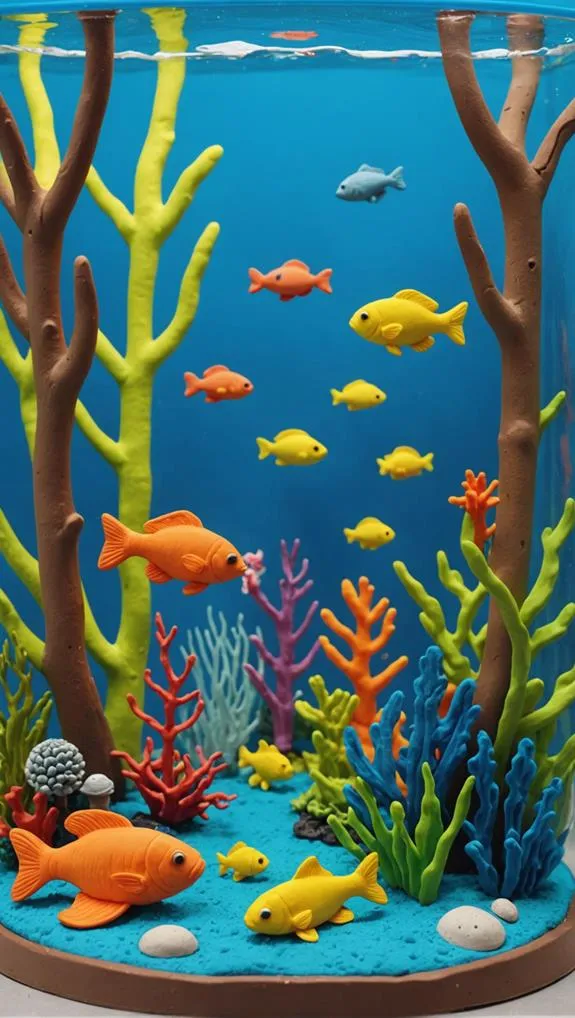
Overfeeding your fish can lead to noticeable behavioral changes that signal something's wrong in the tank. If you spot your fish swimming lethargically or resting at the bottom for long stretches, it's a big red flag. They might be feeling uncomfortable due to all that extra food.
You may also notice a decrease in their excitement during feeding time. When fish ignore food or show less enthusiasm, it's a sign they've had too much.
Watch for increased aggression too. If your fish start fighting over dwindling food, it means they're stressed and competing for what little's left.
Overfeeding can lead to digestive issues, and you might see bloating or swollen bellies.
Lastly, check if your fish are foraging through the substrate. If they're digging through the gravel looking for food, it's likely they're not getting the right amount, and you may have leftover food contributing to the problem.
Frequently Asked Questions
How to Tell if Fish Are Overfed?
To tell if your fish are overfed, watch their behavior closely. Monitor uneaten food, adjust your feeding schedule, and ensure diet balance. Regularly test water quality, as poor conditions can harm fish health and aquarium setup.
What Does an Overfed Fish Look Like in a Tank?
In your tank, overfed fish often show a bloated stomach, sluggish swimming patterns, and fin issues. You'll notice food leftovers and increased aggression, while poor water quality leads to algae growth and decreased tank cleanliness.
What Happens if You Overfeed Aquarium Fish?
Overfeeding your fish disrupts digestion, harms water quality, and stresses fish health. It leads to behavioral changes and diet imbalance, requiring stricter feeding schedules and diligent tank maintenance to meet your species' nutritional needs effectively.
How Do You Treat Overfed Fish?
To treat overfed fish, adjust their diets dramatically! Implement fasting periods, monitor their health, and tweak the feeding schedule. Focus on portion control, pellet size, and aquarium maintenance to enhance water quality and fish behavior.
Final Thoughts
So, if you notice your fish looking a bit too round or the water's turning murky, it might be time to reassess their feeding routine. Remember, a happy fish is a healthy fish, and overfeeding can lead to serious problems. Isn't it funny how our little aquatic friends can be just as picky as we are about their meals? Keep an eye on the signs, and you'll ensure your underwater pals thrive in their cozy home!

